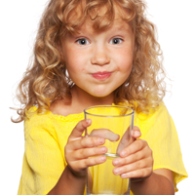Signs and Symptoms of Dehydration
Your child has had vomiting and/or diarrhea for three days, refuses to eat, will only take a few sips of juice, seems less active, and is urinating less often than usual. You begin to worry about dehydration. Here are some tips to help you determine how dehydrated your child might be, when to worry, and what to do.
SIGNS OF ADEQUATE HYDRATION
If your child has most or all of the following signs, then you can be reasonably sure he is not significantly dehydrated:
- Moist, shiny mouth from saliva, pools of saliva under tongue or lips
- Moisture present in eyes, tears dripping out when crying
- Urinating at least every 4 hours
- Active, playful, running around tearing up the toy room
MILD DEHYDRATION
Most children will become mildly dehydrated during the course of any illness simply due to the fact that they won’t drink as much as usual. This is not dangerous. Common signs of mild dehydration include:
- Less active than usual, but still alert and playful
- Lips slightly dry
- Urinating slightly less frequently
WHEN TO BE CONCERNED
Many children will progress to this stage during a gastrointestinal illness. In general, this stage is not dangerous, either. Signs include:
- Less active and playful, but still alert.
- Will make eye contact and respond to you
- Lips are dry and chapped, inside of mouth is slightly dry
- No tears when crying, but eyes still appear moist
- Urinating about half as often as usual
- Urine concentrated like apple juice
WHEN TO SEEK MEDICAL ATTENTION
SEVERE DEHYDRATION
Seek medical attention if your child shows these signs:
- Limp, inactive, makes minimal eye contact, and no response to your voice or touch. This is the definition of lethargic.
- Lips chapped, inside of mouth is dry and sticky with no saliva
- No tears, eyes are dry and sunken in
- No urination for 12 – 18 hours
- Extremely unusual fussiness along with the other symptoms
- Pale
- Very fast heartbeat
NOTE: A child is more likely to get severely dehydrated with vomiting and diarrhea – dubbed a “double-ender” than with either alone
GETTING THROUGH THE NIGHT
Mild or moderate dehydration –most children can make it through the evening and overnight by offering your child small, frequent sips of clear liquids such as:
- Breast milk
- White grape juice
- Pedialyte
- Frozen juice slushy
Severe dehydration is too dangerous to treat at home and should be treated immediately in an emergency room.
Above all, if you are not sure about how dehydrated your child is, you should contact your doctor.
PREVENTING AND TREATING DEHYDRATION ASSOCIATED WITH VOMITING AND/OR DIARRHEA (See Diarrhea)

